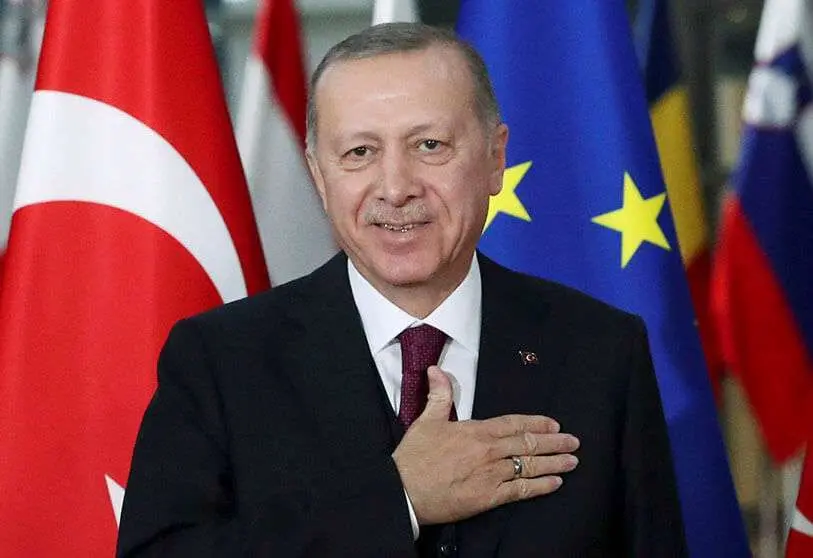Turkey saved from EU sanctions

Sanctions against Turkey because of the conflict and the tensions it is raising in the eastern Mediterranean will have to wait. For the past summer, the Anatolian country has been sailing through the Economic Exclusion Zone of Greece, Cyprus, prospecting and surveying for pockets of oil or natural gas to extract.
Both Greece and Cyprus were shouting in the air and, while the president of Turkey, Recep Tayyip Erdogan, ignored their accusations by excusing himself that Libya had ceded its maritime space to him, the tension has ended up reaching an untenable point.
The European Commission had put the issue on the table for this extraordinary meeting, and although Cyprus had hoped that the Turkish country would be sanctioned, this has not been possible. The talks on what to do with Turkey have been postponed and the Commission is calling for a bilateral dialogue between the countries concerned.
"All differences must be resolved through peaceful dialogue and in accordance with international law. The European Council reiterates its full solidarity with Greece and Cyprus, whose sovereignty and sovereign rights must be respected", the Commission issued a press release this evening.
However, Ursula Von der Leyen warned that if Erdogan continues with his provocations "and chooses a path of unilateral decisions that violate international law, the European Union will use all its tools", she warned sternly before settling the issue. "This is not what we want. We prefer to work on a long-term relationship with Turkey," Von der Leyen stressed.

Since August all eyes have been on Belarus, with the holding of fraudulent elections and the proclamation of Lukashenko as president of a fully mobilised country. The street protests, arrests and arbitrary expulsions are beginning to worry the European Union and Russia, which has visited the country on several occasions to advise the government on how to control the situation.
This is how the Union's leaders have agreed to sanction Belarus for repressing the democratic opposition. Although there was a political consensus to implement these sanctions, Cyprus and Greece were demanding the same determination against Turkey and threatening to block both agreements (as the EU's foreign policy decisions require unanimity).
Finally, after some nine hours of negotiations, the President of the European Council, Charles Michel, explained at a press conference that the EU-27 had found a mixed formula that includes sanctions against "some forty people" whom the EU holds responsible for the violence in Belarus.
But, to the surprise of many, Lukashenko himself will not be sanctioned. Other NATO partners such as Canada and the United Kingdom had indeed decreed a freeze on Lukashenko's assets this week, and the EU felt great pressure to achieve unanimity and avoid a veto.

The leaders also agreed to condemn the recent poisoning of Russian opposition leader Alexei Navalni, and called on Russia to "cooperate fully to ensure an impartial international investigation".
"The use of a military, chemical weapon is incompatible with the principles of dignity and international law," summarised Michel, who explained that the matter would be discussed again at the European Council scheduled for mid-October.
With regard to the fighting between Azerbaijani and Armenian forces in the Nagorno-Karabakh conflict zone, the European Commissioners called for an "immediate cessation of hostilities" and for the parties to "resume political dialogue in the framework of the OSCE".
These demands are being ignored by both Armenia and Azerbaijan, which reject the fact that the OSCE has previously helped resolve the conflict. With reference to the peace talks sponsored by the Minsk Group, both the president of Armenia, Nikol Pashinián, and the president of Azerbaijan, Ilham Aliyev, have been very critical of the inefficiency achieved after almost thirty years.
"They encouraged us and sent us some signals: be patient and the problem will be solved. But I warned them that the Azerbaijani people will not tolerate the occupation and that, if the negotiations do not succeed, Azerbaijan will solve the problem by military means", Aliyev pointed out yesterday.

On Friday, the commissioners will focus on the internal market, digital transformation and industrial policy in the midst of recovery from the pandemic. The Union aims to give each State more strategic autonomy so that it can act independently.
In parallel, the talks with the United Kingdom will conclude this Friday its ninth round of negotiations to define its future relationship three months after the UK releases its ties with the European institutions.
The negotiating session ends after Brussels opened infringement proceedings against the UK on Thursday, subject to European rules during the current transition period, for failing to withdraw the bill violating the agreement on the UK's withdrawal from the EU by the end of September.
Commission President Ursula Von der Leyen announced infringement proceedings against the government of Boris Johnson for failing to withdraw before the end of September a controversial internal market bill that contravenes the agreement on the UK's exit from the EU bloc.
"We need to create a legal safety net to protect the integrity of the UK's internal market, to ensure that ministers can always meet their obligations in Northern Ireland and to protect the gains made in the peace process," said UK government sources.
This controversial legislation will now go to the House of Lords, where the Conservatives do not have a majority. However, if the Upper House were to make changes, these would have to be endorsed by the Commons.
Although Brussels had already warned London that it would take legal action if the bill was not withdrawn before the end of last month, Boris Johnson went ahead with the process.








